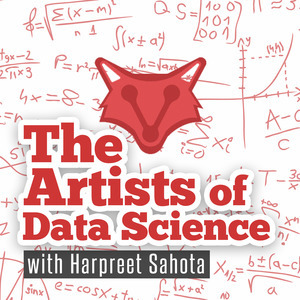Simplify Complexity | David Benjamin
August 20th, 2021
1 hr 15 mins 51 secs
Season 15
Tags
About this Episode
Find David Benjamin online:
Twitter: https://twitter.com/complexitydb
Linkedin: https://www.linkedin.com/in/davidbenjaminsyntegrity/
Memorable Quotes from the episode:
[00:14:17] "Every time you hit something complex, it's new, it's different. There is no playbook, there is no checklist. And really what you have to do is get all the right people involved in sort of sharing what they see. No believe, understand, get them buying into the right way to to move forward. And the last thing I'll say is, you know, the right way to move forward when it's complex is to try things."
[00:17:41] "...you start to see that really the key to dealing with complexity is to get people get their fingerprints all over the solution, get their fingerprints all over the strategy. And I can't imagine a situation where doing Data strategy is only complicated because, again, the market, the business you're in, the people who work there, you know, it's going to be different every time. And of course, are you going on and on."
Highlights of the show:
[00:01:29] Guest Introduction
[00:02:53] Where did you grow up and what was it like there?
[00:03:31] What did you imagine your future would be like?
[00:05:07] What types of things were you doing that then eventually led to to this being the thing that you chose to pursue?
[00:06:22] What does it mean to be a systems thinker?
[00:12:36] What's your favorite example of a problem that on the surface looks like it fits the description of complicated, but as you start to dig a little bit deeper, it turns out that it's actually complex.
[00:14:07] How is the problem solving process different for a complicated versus a complex problem?
[00:17:38] The nature of complexity.
[00:19:39] How do we best deal with that? How do we best deal with something we've never dealt with before without knowing what's going to work and what's not going to work?
[00:24:40] What is DIKW model?
[00:32:53] Letting go is a huge part of good leadership.
[00:37:57] What are some questions that we can ask ourselves so that we can find a way forward in these types of situations?
[00:39:57] Can we inject requisite variety into our world in different ways?
[00:48:00] What's the number one book of Stafford Lehr that myself and the audience would really benefit from his thoughts?
[00:48:55] What's the difference between constructing a good question and asking a question?
[00:51:39] What are rules of queueing as you've discussed in your book?
[00:53:18] How do faulty assumptions make us ask bad questions?
[00:55:33] Why is it that when we are having these face to face types of interactions and discussions that we're able to create complexity?
[00:57:27] Does that have an effect on anything when we're working together?
[00:59:31] Is cracking complexity, an art or a science?
[01:01:33] How do we create serendipity when we're working on complex problems and maybe when we're working isolated from people?
[01:04:34] RANDON ROUND
[01:04:49] It's one hundred years in the future. What do you want to be remembered for?
[01:08:23] What do most people think within the first few seconds when they meet you for the first time?
[01:09:09] Do you think you have to achieve something in order to be worth something?
[01:09:59] What are you currently reading?
[01:11:39] What song do you have on repeat?
[01:12:28] What's the story behind one of your scars?
[01:13:02] What is one of the greatest values that guides your life?
[01:13:45] If you could have any superpower, what would it be and why?
